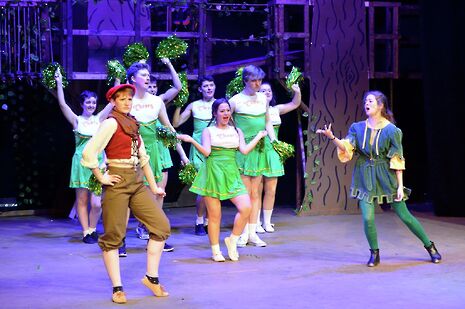Review: CUADC/Footlights Pantomime 2015: Robin Hood
The ADC season goes out with a bang

Oh, it really was good. One learns to expect a certain calibre from the sacral canon of the Footlights, leaving an ample burden of expectation bearing down upon the shoulders of cast and crew in equal measure. But by every measure, they met their challenge. This year’s Robin Hood was a triumph adorned with absurdity and mockery of the highest order.
For the first five minutes, though, upon introduction to the stock characters and setting – the rural outskirts of Sherwood forest, a nagging dread began to set in: perhaps this wouldn’t showcase the edgy humour we had come to anticipate from the descendants of Python, Perkins and Fry; maybe this really was a Panto predominantly tailored – shock horror – for the kids? The opening number was musically very solid, and even amusing, but far enough away from side-splitting to culture a seed of genuine worry. One could almost feel small sections of the audience willing ‘less ditty, more witty’.
Thankfully, the ‘witty’ was provided in such abundance following the opening gambits, and the slope into hilarity, depravity and extravagant punning so steep, that all such fears were swiftly allayed. The flag-bearer for this safe passage to Nottingham’s naughtier side was Tim Atkin’s ‘Freya Tuck’ (yes, you read that correctly) and her undoubtedly unscrupulous ‘Mrs F. Tuck’s Tuck Shop’, the Pantomime dame, reimagined but just as rambunctious as you could possibly desire.
It would be most unfair to characterise Robin Hood as an exercise in vulgarity, however. The vast majority of the variety of gags on offer were really very well constructed and, above all, intelligent. Whether it was Super Mario or Marxist sovereignty, the combination of delicious writing and usually perfect comic timing pushed just the right buttons to have the ADC’s baying audience in the thrall of its players and in the midst of fits of laughter with more regularity than I can remember having experienced of any Cambridge production before.
Conductor Stephen Gage and his live band provided flawless accompaniment throughout, the pre-interval ‘Vanilla’ with its not-so-subtle product placement was an all-cast highpoint. Toby Marlow’s score, which winked at, habitually at the same time as poking fun at, the modern classics of Disney’s Frozen and Les Mis, played out against a truly impressive array of sets. From dungeons to forests, mills to castles, this was no budget production, but then the Footlights, as current form attests, are no average bunch. Indeed, one standout performance – in her Cambridge debut, no less – was that of Ashleigh Weir, whose candid Marian swung from beautiful song to dry, killer punchline with the ease of a seasoned actress. Sasha Brooks’ curiously comical mute milkmaid, Jack Needham’s ‘Blake’, a born-again Christian thrown forward from ‘90s Nottingham University and especially Orlando Gibbs’ imperiously evil Sheriff also stole the show at various points.
The same could not typically be said of the eponymous Robin, played soundly by Eleanor Colville, which was rather peculiar given that the excellent script was, in part, her own. She did have her moments, though. One feature out in force was the prolific breaking of the ‘fourth wall’, which was set up perfectly for Colville’s Robin, and his blossoming relationship with a cross-dressing Marian, to exploit. As a woman playing a man unsure about his sexuality, opposite another woman playing a woman, playing a man, she (he? I’ve lost track at this point) was afforded some marvellous material. Far from being cheap or offensive, these gags struck the perfect chord between politically incorrect and politically astute.
In fact, the show as a whole took great inspiration from political parody. The central feud between the Merry Men’s Socialism (Alan-A-Dale’s Russian folk dancing a particular treasure) and the Sheriff’s Conservatism, austerity and welfare cuts proved the rather topical bedfellow of this imagined mediæval Nottingham, divided by class warfare. A delightful touch was the villainous Sheriff’s subtle David Cameron-esque gesticulation, explication and rosy cheeks. Wisely, never did we descend into fully-blown satire, just enough tongue-in-cheek to have you thinking about your left-wing leanings over an ice cream at the midway break. This break proved valuable, for the pantomime neared three hours in total. The trouble is, I’m not sure there was much that they could, or should, have cut. A veritable glut of delights, I would have feasted and feasted again. Of course it was silly, of course it was frivolous, of course it was completely ridiculous. And that was why it was so much fun.
 News / Hundreds of Cambridge academics demand vote on fate of vet course20 February 2026
News / Hundreds of Cambridge academics demand vote on fate of vet course20 February 2026 News / University Council rescinds University Centre membership20 February 2026
News / University Council rescinds University Centre membership20 February 2026 News / Judge Business School advisor resigns over Epstein and Andrew links18 February 2026
News / Judge Business School advisor resigns over Epstein and Andrew links18 February 2026 News / Petition demands University reverse decision on vegan menu20 February 2026
News / Petition demands University reverse decision on vegan menu20 February 2026 News / Caius students fail to pass Pride flag proposal20 February 2026
News / Caius students fail to pass Pride flag proposal20 February 2026









